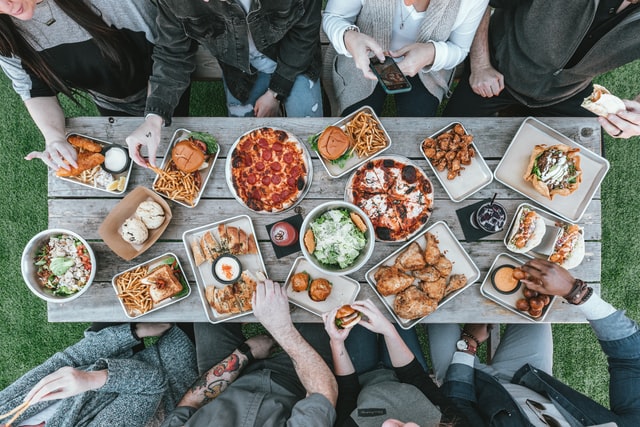Meal plans – the reality:
As we move into the colder months and back into some semblance of a pre-covid routine, that New Year’s resolution to shift the lockdown weight may seem like a distant memory. Meal plans are one way people attempt to avoid this inevitable slump in motivation.
“I just want a meal plan. I just want someone to tell me what to eat”
Have you been guilty of uttering these words? Maybe you’ve said it to your colleague, your friend, your partner or your pet? Have you been sucked into a “free meal plan” (provided you handed over a valid email address and spent the next year deleting email spam)?
Do you have an expensive fitness app subscription that provides daily meal suggestions? Did your PT write you out a meal plan that you’ve since misplaced?
Have any of these worked for you? If they have, good on you. If they haven’t, it’s not your fault.

Why have meal plans not worked for me?
Whether in the form of a downloaded e-book, your PT’s handwriting, or an app subscription, meal
plans tend to follow the same format:
- The most basic simply give you food suggestions. These are designed to meet a (usually over-restricted) energy target to promote weight loss.
- The more thorough versions aim to provide an allotted amount of energy distributed across our three main nutrients – carbohydrate, protein and fat.
- With meal plan apps you might be afforded a certain level of flexibility. This may be in the form of swapping different snacks and meals to personalise it further.
But no matter how flexible, varied and user-friendly these plans are, they face one infallible flaw: they exist in a vacuum.
The raw truths about meal plans:
A meal plan does not care if it’s Sarah’s birthday this weekend and you’re going to an all-you-can-eat taco bar. It does not account for your parents being in town and wanting to take them to your favourite restaurant. Unscheduled celebration drinks for a colleague’s engagement? Nope. Your healthy sandwich store is shut? Whatever.
You must still somehow eat those dictated three meals and two snacks and avoid all temptation in your path. And the icing on the proverbial beetroot and carrot cake with no added sugar? If you DO succumb, if you DO let your fingers close around a few tasty tacos, then you have to deal with the GUILT! Oh the guilt. It creeps up on you at your next meal time, questioning your choices.
I mean, you’ve deviated from the meal plan already, why stop there? Why not forget the whole thing? You gave it a good go, but you just couldn’t get to the supermarket on Sunday.
Now you don’t have the ingredients to prep tomorrow morning’s oat granola parfait with mandolin sliced strawberries and a honey reduction. Or the energy. MAFS is on. Just eat bread from the bag like last night.
Seriously; these meal plans have no respect for the chaos that is “an average week”.

The premise is sound. Help people eat healthier by taking arguably the hardest part out of the equation – the decision making. However, a key component is missing – flexibility.
This makes it the same as any other fad diet marketed by the billion dollar health and wellness industry. It is there to give the illusion of diet control. Simultaneously it is providing a product that is unsustainable and will inevitably end in failure. Harsh, but true.
So how can you make a meal plan actually work for you?
- Factor in the flexibility you need. Maybe you know you will always be having the same thing for breakfast, but you’re prone to having lunch wherever a colleague suggests. Or you know by Thursday you’re craving a McDonald’s cheeseburger and that’s when your “healthy” week gets derailed. That’s fine – just factor it in. Don’t expect your food behaviours to change just because you’ve downloaded an app (scandalous, I know).
- Have back up meals that take five minutes to prepare. In a perfect world you’d cook a gourmet, perfectly prepared meal every night. But that’s just not realistic. Have some back up meals in your arsenal. This may be a frozen meal, eggs on toast, or a healthy takeaway.
- Don’t let one bad day ruin your week…or your month. This is critical. So often we get
into that “all or nothing” mentality when it comes to food. Imagine if we let this thinking dictate our decisions in any other parts of our lives. You have a bad day at work – may as well quit. You have an argument with your partner – throw the whole relationship away. Not very sustainable is it? The same applies with changing your eating habits. If you’ve struggled to make healthy choices on a single day, that’s fine. Go to bed and try again tomorrow (it also helps to start identifying why that may have happened and that’s where I come in). - Expect change to take time. Fad diets and other weight loss programs often include one key thing – instant results. So often these are unsustainable and promote yo-yo dieting. This is where you end up putting back on all the weight you lost plus more after the “program period” is over. Real change does take time. The most important difference is that you end up being able to sustain these changes for the long term. If you’re a chronic crash dieter, you’ve likely spent more time on these programs than it would take to implement long-term food behaviour change. Such changes would keep you healthier for the rest of your life.
- See a dietitian. If you’re struggling to make dietary changes, see a dietitian. We’re accredited, we’re experienced and our science-based recommendations are based around your lifestyle. We’re also trained in medical nutrition therapy. This means if you have any medical conditions, or are on any medications, our recommendations will take that into account. I’m yet to see a generic meal plan that does that.
Yours in health, Bella
Accredited Practicing Dietitian
You may enjoy this blog by Bella:
https://portmelbournephysio.com.au/7-weightloss-mistakes/
Here is a link to Bella’s website:

